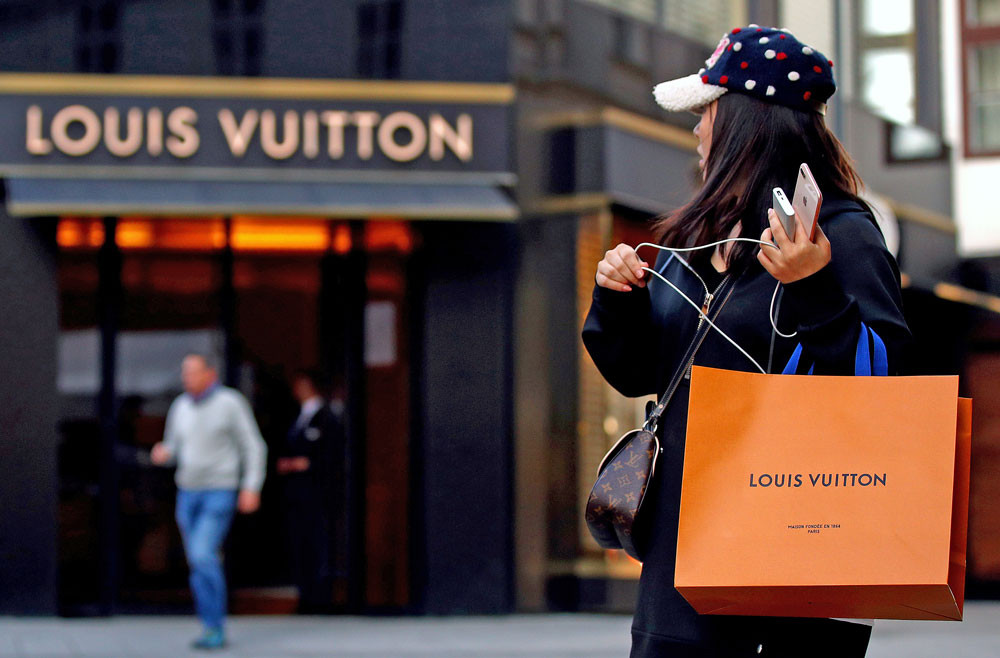Popular Reads
Top Results
Can't find what you're looking for?
View all search resultsPopular Reads
Top Results
Can't find what you're looking for?
View all search resultsWhat slowdown? China's riding to the rescue of luxury brands
Despite China's economic growth slowing to a three-decade low, shoppers are continuing to spend heavily on luxury - but they are doing it at home or online, with their wallets reinforced by savings on flights, hotels and other steep holiday costs.
Change text size
Gift Premium Articles
to Anyone
W
hen Tiffany & Co said this month it was sending its priciest jewelry to mainland China to reach wealthy shoppers no longer jet-setting abroad, it reflected a trend helping global luxury brands weather a Chinese economic slowdown.
Well-off Chinese consumers, whose trips to fashion capitals like New York and Paris have long buttressed luxury-sector sales, are increasingly staying at home because of a weaker yuan currency which has blunted their overseas firepower.
Hong Kong, another top shopping destination, has also become less appealing due to mass anti-government protests that have erupted into violence on some occasions.
However third-quarter earnings showed that, despite China's economic growth slowing to a three-decade low, shoppers are continuing to spend heavily on luxury - but they are doing it at home or online, with their wallets reinforced by savings on flights, hotels and other steep holiday costs.
Several large US and European luxury brands reported strong demand for their goods in China, even as Beijing and Washington remain embroiled in a trade war.
Lisa, a finance worker in her late 20s, is among Chinese shoppers who are increasingly turning their eyes away from foreign shores.
"I don't feel like there is such a big gap anymore between prices overseas and at home, so when I feel like making a purchase I usually just go straight to the store these days," she told Reuters outside a Hermes outlet in Shanghai.
Hermes, known for its leather goods, printed silk scarves and Birkin bags that cost $10,000 or more, said its stores in mainland China had outstanding results that helped fuel a 19% sales gain in the wider region.
The French company opened its 26th boutique in China in July in Xiamen and continues to build out its e-commerce site for Chinese customers, hermes.cn, launched a year ago. Italy's Moncler is meanwhile studying expanding the size of its stores in big cities like Beijing and Shanghai.
Read also: What makes a Patek Philippe tick?
"The whole economy is slowing down and salary growth is also slowing. So consumers who originally bought when they travelled will now buy domestically," said Iris Pang, Greater China economist at ING.
She added a cut to sales taxes this year which prompted some luxury brands to lower their prices in China could also be an attraction.
Hong Kong protests
The strength in China has helped insulate luxury companies from a major financial hit from months of pro-democracy demonstrations in Hong Kong that have forced them to temporarily close shops and which have kept tourists away.
Kering's Gucci fashion label, for example, said it has managed to make up for lost business in the former British colony due to spending shifting back to mainland China.
The turmoil is far from over, however, with protests in Hong Kong descending into clashes between demonstrators and police this week.
In the United States, meanwhile, Tiffany boss Alessandro Bogliolo told Reuters this month the company was pursuing Chinese buyers who were staying at home, saying it needed to "follow customers where they shop".
He has sent high-end jewellery including diamond necklaces costing $1 million or more to its stores in mainland China from New York.
The demand for luxury in China may even be aiding more mass-market players like personal care products maker Procter & Gamble Co, which raised its global sales forecasts on the back of premium beauty brands such as China Olay.
Emma Zhang, a 32-year-old investment analyst in Shanghai, said she was indulging more in what she said were little luxuries.
"I used to be the type to buy many cheap items, and would change them frequently," she said. "My shopping habits have changed and I've been buying things that are better quality."











